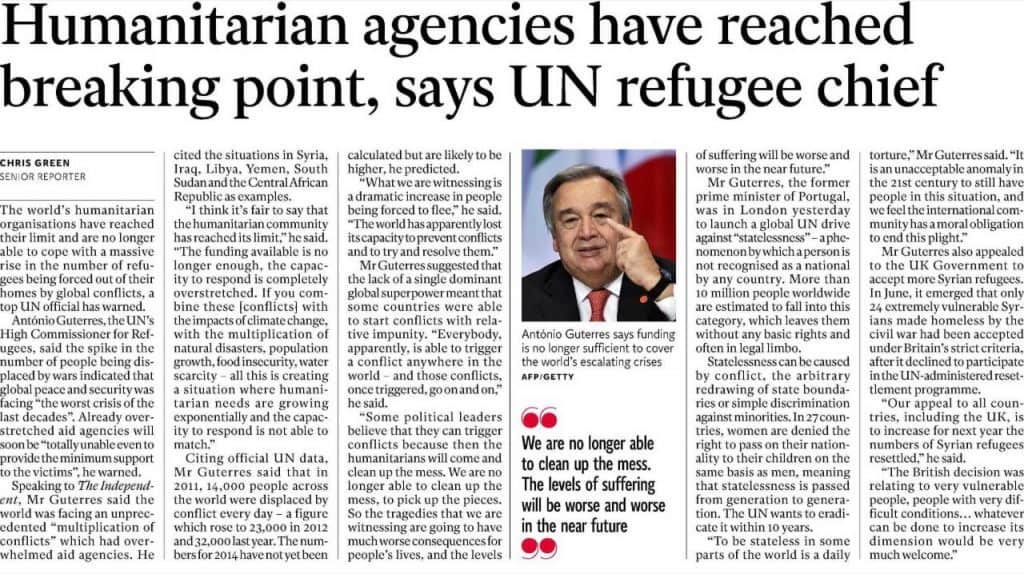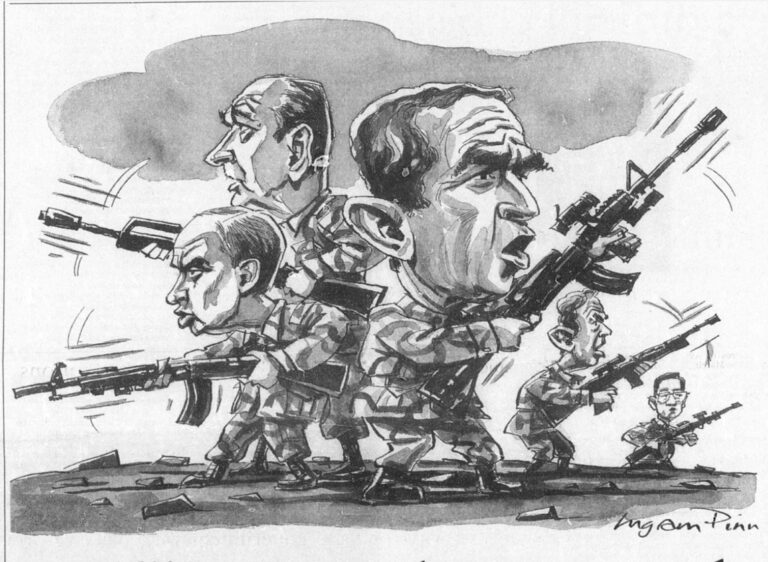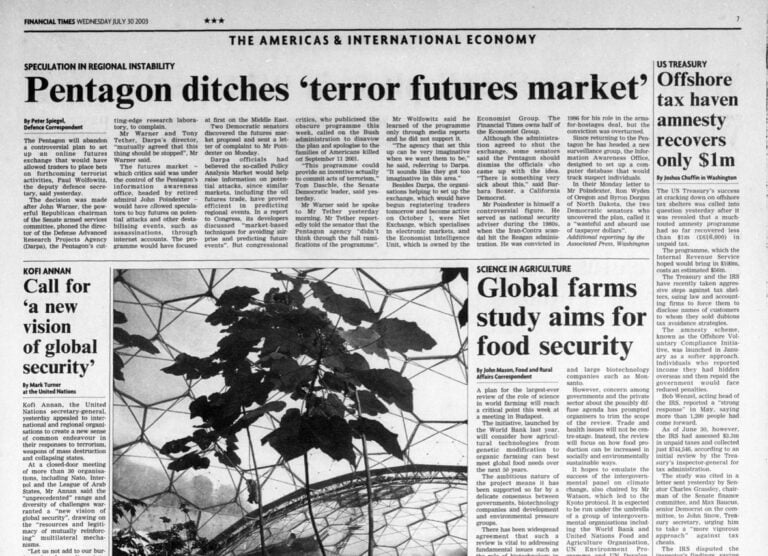By Grace Mitchell-Kilpatrick, Gale Ambassador at the University of Exeter
‘Global security’ is a broad and multifaceted phrase. Whilst national security can be defined by the territorial boundaries of physical and cyber safety, global security is more complex. In this anarchical world, states are not answerable to a higher force; there is no international police force or law enforcement and despite the existence of supranational bodies such as the United Nations, World Bank and European Union, their scope and power is limited. For the purpose of this review, I will explore a plethora of global threats at surface level.
I believe that threats to global security are a result of the pressures that nature and other demands, in particular globalisation, have placed on states. These demands are too vast for national security to tackle alone. The global interconnectedness and interdependence of states since the end of the Cold War is necessary to tackle the challenges posed to global security. The ‘security complex’ denotes the situation whereby the security needs of one state necessitate taking account for the security needs of other states due to the interdependence. The fear of the complex breeds rivalry between states which can be remedied by cooperation.
The first challenge posed to global security lies in the lack of international justice delivery by institutions. According to Mark Huband, writing in the Financial Times in 2004, there is a pressing need to strengthen and reform international institutions. NATO, the United Nations and the European Union have struggled to keep the peace in times of conflict. For example, the headquarters of the United Nations were bombed in 2003, demonstrating how weak physical security was for international institutions. Conversely, these bodies also struggled to administer international justice in conflict-ridden and post-conflict societies. Take Rwanda, Yugoslavia and Bosnia as prime examples where the International Tribunals did not prosecute the majority of perpetrators, nor did they instil peace measures in society successfully. Reform is therefore required in the form of a strengthened capacity for rule of law, judicial and governmental personnel to implement it and a civilian police capacity. For victims, international bodies should support national governments in creating new protective legislation, enforcing accountability for perpetrators and rebuilding trust within the society, perhaps with a representative on the ground. These measures could go some way to salvaging the lack of international justice which has so far been delivered.
In Gale Primary Sources, I used the ‘term clusters’ tool to see what other topics are related to the term global security. According to Green, writing in The Independent in 2014, the United Nations warned that the world’s humanitarian organisations have reached their limit and cannot cope with the influx of refugees being forced out of their home by global conflict. Displaced people in Yemen, South Sudan, Central Africa, Syria and Iraq pose a strain on aid services; this strain is magnified by the multiplication of natural disasters, pollution and water scarcity.


Another issue of global security feeding into the global anarchy is the existence of ‘stateless’ people, people who are not delimited by a border and do not belong to a nation as such. Over 10 million people are ‘stateless’, meaning they have no basic legal rights or physical protection. The increase in ‘statelessness’ has correlated with a rise in discrimination against minorities. This is an inherent issue; in 27 countries women are not allowed to pass on their nationality to their children (unlike men), making statelessness a generational issue as well.
The second area which I argue is a global security challenge is the domination of weak states by powerful states. In the same vein as the prior article, the article ‘Conflict, Complacency and Confusion on Global Security’ argues that weak states lack capacity to confront terrorism and criminal gangs due to a lack of international aid. This could be because of the self-interested nature of rational state actors. Incentive to provide international aid often derives from ulterior motives such as economic or political interests. Often states enter an area and then justify their intervention on the basis that the area has been weakened which tarnishes intervention as more negative than positive. Power inequalities between the less economically developed states and the global superpowers are therefore an exacerbator of the global security challenge. Kofi Annan was the United Nations Secretary General between 1997 and 2006. In his autobiography, Interventions: A Life in War and Peace, he suggested a fundamental review of the United Nations capacity to cater for the division between these state groupings.[1]

In a speech given by Annan, and reported on by the Financial Times in 2003, he stated that there is a need for an international response to terrorism, weapons of mass destruction and collapsing states. He stated an “unprecedented” range and diversity of challenges present a new global security challenge, drawing upon mutually reinforcing multilateral mechanisms. The Security Council tightened its security after the 9/11 bombings, yet the majority of institutions still need to evolve, and at the same pace as the challenges.

Turner, Mark. “Call for ‘A New Vision of Global Security’.” Financial Times, 30 July 2003, p. 7. Financial Times Historical Archive, http://tinyurl.galegroup.com/tinyurl/8r5HG5
Let us consider the threats of cyber-security and terrorism. Although separate issues in their own right, the merging of these heightens the global security threat. Cyber-crime poses a threat due to the rapidly developing ability of technology users. For example, this article by Ben Hunt in The Independent in 2003 refers to the ‘Mafia Boy’, a 15 year old Canadian who hacked financial communities and reservation services in the US. This demonstrates the vulnerability of businesses and national governments to hackers and data leaks. According to Tom Noonan, the Chief Executive of Internet Security Systems, the government alone cannot handle threats like these.
Considering this in relation to terrorism, the ability – and ease – of communication via online platforms facilitates the spread of extremist propaganda. We have seen a sharp rise in the number of individuals being radicalised on the internet which has led to the organisation of terrorist attacks, violence and human trafficking. I attended a lecture given by Rob Wainwright director of Europol and he warned that ideology from countries such as Afghanistan, Pakistan, Somalia and Yemen are being instilled in the West, often linked to religiously motivating factors. Two thousand websites promoting terrorism have been taken offline since 2010 by the Metropolitan Police counter-terrorism unit. Yet the power of groups such as ISIS has grown exponentially and is hard to monitor and control. Thus, this classifies as a increasingly serious global security issue.
The third major global security challenge I will discuss is the food and fuel crisis. The article entitled ‘Global security fears over food and fuel crisis’ published in the Financial Times in 2008, outlines some of these challenges. The issue of food and energy shortage is exacerbated by the limited agriculture, global warming and destabilising costs in the developing regions of the world. Scarcity of resources is becoming increasingly alarming considering the rate of population growth and increased mortality rates. Confluence of record oil and food prices – in particular corn, soya beans and meat – have led to shortages in some areas. This has in turn caused famine, malnutrition, disease and even sanitation issues in developing countries, some of which are also caused by structural problems. In terms of energy, Saudi Arabia, the biggest oil producer, realised the danger as Pakistan pleaded for a reprieve from oil payments.
![Hoyos, Carpia, et al. "Global security fears over food and fuel crisis." Financial Times, 21 June 2008, p. [1]. Financial Times Historical Archive, http://tinyurl.galegroup.com/tinyurl/8r5MV0](https://www.gale.com/intl/blog/wp-content/uploads/2019/04/image-4-2.jpg)
[1] Kofi Annan, Interventions: A Life in War and Peace, United Kingdom: Penguin (2013)

